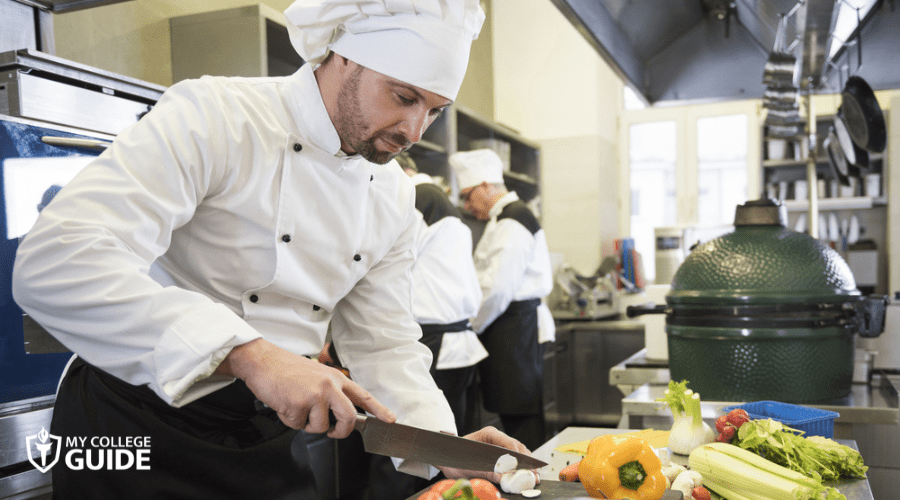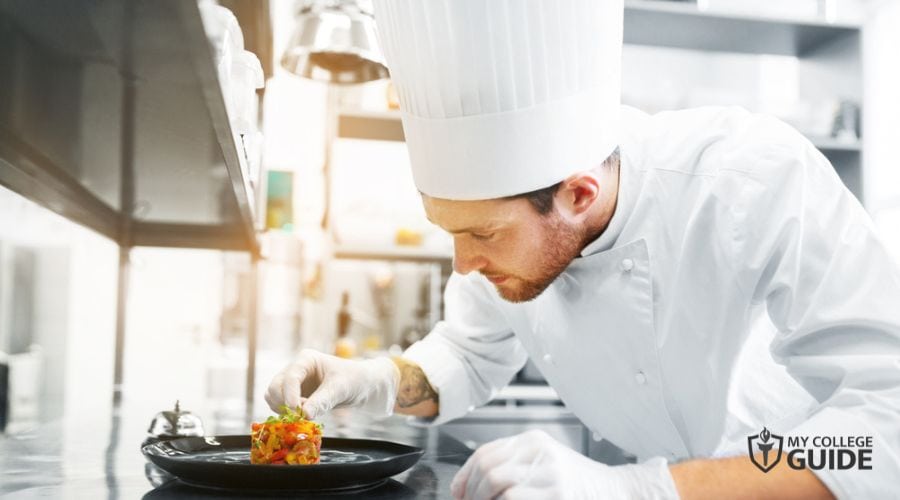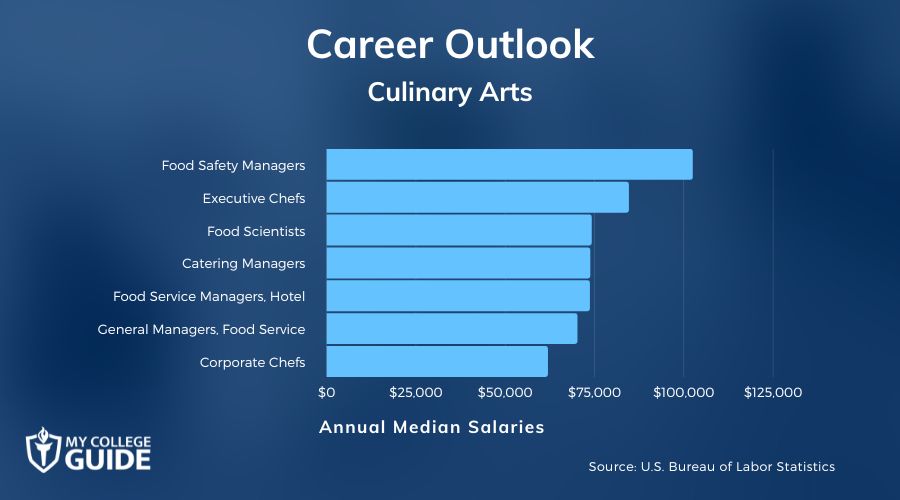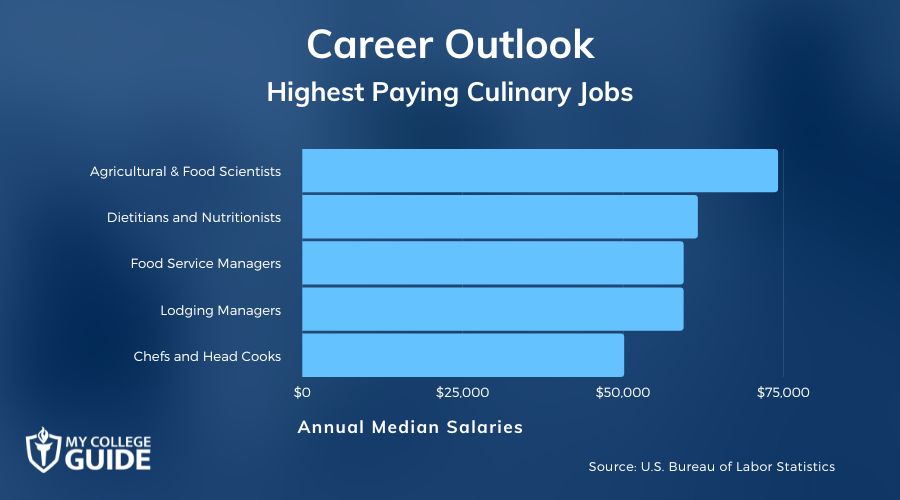If you love cooking and food, many exciting culinary careers can help you turn your passion into a profession.

Culinary professionals are essential in the culinary, food, and hospitality industries. They create positive food experiences for customers by skillfully designing, prepping, cooking, and presenting meals.
Editorial Listing ShortCode:
A culinary degree can prepare you for many different careers in this fast-paced and rewarding field. Through coursework and other experiences, you can develop interpersonal skills, elevate your cooking abilities, and gain a thorough understanding of food science.
What Can You Do With a Culinary Degree?

A culinary degree may qualify you for many fascinating careers. Culinary professionals can secure positions in several industries, including:
- Education
- Food and beverage
- Healthcare
- Hospitality and tourism
Some culinary professionals pursue cooking careers in restaurants, food trucks, and other customer-focused settings. Common positions in these areas include baker, caterer, chef, and sommelier. These hands-on culinary art careers can allow you to continue developing your cooking and food presentation skills.
Editorial Listing ShortCode:
Culinary degree holders can also secure management or production careers in the food industry. For example, you can manage a restaurant or brew beer for retail sales. Other individuals work in private settings as personal chefs for celebrities or executives. Depending on your skill set, you can pursue more creative options, like becoming a food blogger or photographer.
The U.S. Bureau of Labor Statistics anticipates that many careers in culinary arts will have positive job outlooks in the next few years. The demand for chefs and head cooks will increase by 15% in the next few years, a much faster than average rate of job growth. Similarly, the Bureau predicts that food service managers will experience 10% job growth over the same period.
5 Things You Can Do with a Culinary Arts Degree
The expertise and skills you gain while completing a culinary arts degree can help you pursue many unique jobs. Here are five fulfilling careers that blend art, cooking, and culture.
1. Cake Decorator

If you have artistic talent and a keen eye for detail, you may excel as a cake decorator. These professionals create elaborate, customized cakes for clients and special events.
They design, prepare, and style cakes using edible ingredients like candies, fondant, and frosting. For example, a decorator may create a cake shaped like a school for a teacher’s retirement or make a castle cake for a Harry Potter-themed wedding.
2. Caterer

A caterer cooks and serves large quantities of food for events like conferences, graduation parties, and weddings.
Typical responsibilities include meeting with clients, planning menus, preparing food, artistically presenting the meal, and serving guests during the event. You may also need to customize meals to accommodate allergies and dietary restrictions.
Many people open their own catering companies, so it can be helpful to develop business expertise and strong management skills.
3. Food Stylist

A food stylist makes food look as attractive and mouth-watering as possible for clients and the media. They use artistic cooking techniques to prepare, arrange, and accessorize food.
This process may involve creative strategies like painting food to look more appealing or using wax to keep dishes positioned correctly. Editors, photographers, and other professionals use stylized food in advertisements, food blogs, and magazine photos.
4. Pastry Chef

A pastry chef specializes in preparing delicious desserts and other baked goods. For instance, a pastry chef may create artisanal bread, cookies, croissants, and cupcakes.
Pastry chefs can find employment in various food and hospitality settings, including bakeries, casinos, convention centers, hotels, restaurants, and supermarkets. Valuable pastry chef skills include creativity, leadership, and a strong knowledge of the science of baking.
5. Winemaker

A winemaker oversees the entire process of transforming fruit into tasty wines. This complex operation involves many steps, including growing and harvesting grapes, creating recipes, fermenting the fruit, and marketing the wine.
Editorial Listing ShortCode:
Winemakers typically have an in-depth understanding of viticulture, the science of cultivating grapes. Most professionals in this field work for consulting firms, vineyards, and wine companies. If you enjoy using art and science to create delicious foods, one of these enriching careers in culinary arts may be a great fit for you.
Culinary Arts Careers & Salaries

There are several career paths in the culinary world, from food safety and inspection to restaurant management and specialized chefs.
To give you an idea of what food industry careers are available after graduating from a culinary program, we have put together a list of the top 40 culinary careers and salaries to give you some career ideas. The table below also includes each career’s median annual salary according to the U.S. Bureau of Labor Statistics.
| Careers | Annual Median Salaries |
| Food Safety Managers | $102,450 |
| Executive Chefs | $84,570 |
| Food Scientists | $74,160 |
| Catering Managers | $73,760 |
| Food Service Managers, Hotel | $73,650 |
| General Managers, Food Service | $70,160 |
| Corporate Chefs | $61,900 |
| Dietitians and Nutritionists | $61,650 |
| Restaurant Managers | $61,220 |
| Chefs de Cuisine | $61,170 |
| Executive Sous Chefs | $59,910 |
| Cooking Instructors, Postsecondary | $59,840 |
| Food and Beverage Managers | $59,440 |
| General Managers, Restaurant | $58,500 |
| Head Chefs | $50,160 |
| Sous Chefs | $48,390 |
| Food Science Technicians | $46,590 |
| Winemakers | $46,030 |
| Pastry Chefs | $45,450 |
| Kitchen Managers | $43,305 |
| Personal Chefs | $42,920 |
| Kitchen Chefs | $39,903 |
| Assistant Pastry Chefs | $38,794 |
| Food Preparation Supervisors | $37,130 |
| Pastry Cooks | $30,721 |
| Food Processors | $30,480 |
| Cooks, Restaurant | $30,014 |
| Banquet Cooks | $30,010 |
| Cooks, Institution and Cafeteria | $29,910 |
| Retail Bakers, Food and Beverage Stores | $29,900 |
| Bread Bakers | $29,750 |
| Commercial Bakers | $29,690 |
| Prep Cooks | $29,099 |
| Line Cooks | $28,849 |
| Grill Cooks | $28,558 |
| Cafeteria Attendants | $27,164 |
| Bartenders | $26,350 |
| Waiters and Waitresses | $26,000 |
| Restaurant Hosts and Hostesses | $25,980 |
| Fast Food Cooks | $24,180 |
When it comes down to it, restaurants are likely to always be on the search for talented chefs to make them stand out from the crowd. Due to this, the culinary career outlook is positive despite the competitive industry. If you are interested in finding out what the growth rate is for specific jobs in culinary arts, we recommend that you look at the U.S. Bureau of Labor Statistics for accurate data on outlook and salary.
The BLS projects that the outlook for chefs and head cooks within the culinary industry will grow 15% over the next 10 years. This growth rate is faster than the national average across all occupations. Additionally, food service managers are expected to have a 10% growth in the same time frame, which is comparable with the national average.
Editorial Listing ShortCode:
Based on the job outlook and low time frame to get started in the field, many students find culinary degrees to be excellent starting points for a promising career. If you have an excellent work ethic and passion for food, a cooking vocation may be the perfect choice for you to enjoy a fast-paced and varied occupation.
How to Know if Culinary is Right for Me

There’s no set formula to determine if you will succeed in a career in culinary arts, but here are some helpful signs that this path may be a good fit for you:
- You’re competitive
- You enjoy learning new things
- You feel passionate about feeding other people quality meals
- You have the stamina to keep up in busy kitchens and other settings
- You like creating new recipes
- You love food and cooking
- You’re interested in the science of baking and cooking
If these traits describe you, you may find job satisfaction and personal fulfillment by pursuing a culinary arts career.
What is a Culinary Degree?

A culinary degree is achieved after you complete a course of study that focuses on culinary arts, food, or hospitality.
The most common degree among chef candidates is an associate’s degree in culinary arts. This program provides a 2-year foundation in culinary training that you can then use to pursue chef work or advance to a bachelor’s degree program.
Editorial Listing ShortCode:
There are several fields within the culinary arts, including ethnic cuisine and pastry work. However, throughout the course of any culinary degree program you will likely take courses that cover the following topics:
- Basic and advanced culinary skills training
- Management and leadership
- Kitchen theory
- Classical culinary foundations
- Accounting and business principles
If you are interested in jobs with a culinary degree, there are reputable online culinary schools that offer culinary degree online programs that allow you to learn essential skills on a schedule that fits into your busy life.
What Are the Highest Paying Culinary Jobs?

A culinary arts degree can prepare you for many lucrative careers in the food service industry and other areas. According to the Bureau of Labor Statistics, here are five high-paying culinary jobs:
| Careers | Annual Median Salaries |
| Agricultural and Food Scientists | $74,160 |
| Dietitians and Nutritionists | $61,650 |
| Food Service Managers | $59,440 |
| Lodging Managers | $59,430 |
| Chefs and Head Cooks | $50,160 |
Just as with criminal justice careers and careers in economics, factors that may influence your career path and potential salary include education, geographic location, and work experience. Completing a culinary degree, networking, and participating in internships in your preferred field may help you qualify for higher-paying jobs.
Do You Need a Culinary Degree to Be a Chef?

Many culinary art careers, including caterer and chef, do not require a culinary degree. Individuals often start in entry-level positions and learn their craft on the job.
Although not strictly required in many roles, a culinary degree does offer several advantages. You can:
- Develop valuable skills like discipline and organization
- Gain access to more networking opportunities
- Learn advanced cooking techniques
- Possibly qualify for more advanced positions, like college instructor and executive chef
- Train with highly skilled cooking instructors
A degree can be a strategic investment if you want to advance or jumpstart your culinary career.
How Much Does a Chef Make?
The average salaries for culinary arts careers can vary widely between positions. According to the Bureau of Labor and Statistics, here is the median salary for a few common jobs:
| Careers | Annual Median Salaries |
| Food Service Managers | $59,440 |
| Chefs and Head Cooks | $50,160 |
| Supervisors of Food Preparation and Serving Workers | $37,130 |
| Bakers | $29,750 |
| Cooks | $29,120 |
While a culinary degree doesn’t guarantee a higher salary, you’ll gain advanced knowledge and skills during your studies that may help you qualify for more senior roles. Advanced positions frequently have a higher wage, but many factors can influence your pay, like education and location.
Is Culinary Arts a Good Career?

Yes, culinary arts is a good career for many professionals. If you love cooking, you may enjoy creating culinary masterpieces for other people. You can continually refine your cooking skills and experiment with new foods and techniques.
Editorial Listing ShortCode:
The food and hospitality industries offer diverse career options. Whether you enjoy hands-on cooking, managing other people, or styling food, you can find the right fit for you. Careers in the culinary arts also tend to be hierarchical, providing many opportunities for advancement. For example, you may get promoted from sous chef to executive chef or restaurant manager after gaining work experience.
Getting Your Culinary Degree Online

An online culinary degree can help you gain a thorough understanding of business fundamentals, food science, and advanced cooking techniques.
Some programs will allow you to specialize in an area of the culinary arts, like food styling or pastry baking. A culinary degree can prepare you for various challenging and fun careers. With a bit of research, luck, and the right experience, you may find a great position that aligns closely with your interests.
If a culinary degree sounds like a good fit, you can kickstart your educational journey today by exploring accredited universities.
